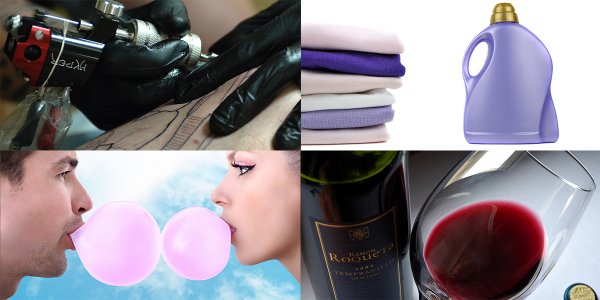6 Ordinary Things You Never Knew Are Made From Dead Animals
Tags: opinion

Whether you’re an ethical eater who strives to live cruelty-free or someone who just gets squeamish thinking about animal products being in their hard-earned clothing and cosmetics products, this list is bound to freak you out. That’s because unknowingly, millions of people purchase items and/or invest in trends that contain the remnants of long-dead animals.
Fortunately, you can use this list to educate yourself and avoid the items. Alternatively, you can take great care to find suitable alternatives that complement your lifestyle but don’t result in the needless suffering of animals.
Following are 6 ordinary things you probably never knew come from dead animals:
1) Tattoo Ink
Absolutely, tattoo ink looks cool. However, unless you are specifically asking your artist to source vegan ink, chances are your are injecting ingredients into your skin that are made from incarcerated animals. Burned animal bones is what gives black ink its crisp, dark color.
Additionally, animal fat is commonly used as an ink stabilizer. Gelatin sources from animals’ hooves also serves as a binding agent. Finally, certain inks use resin from shellac beetles for binding.
If this reality bothers you, be sure to source vegan ink. Or, seek out a vegan tattoo shop that specializes in soy-based inks, such as this one in Portland, Oregon.
2) Chewing Gum
Chewing gum seems like a harmless product, but certain companies utilize the ingredient lanolin. Sourced from sheep, lanolin is a waxy component that is naturally produced by the sebaceous glands in sheep’s skin. It ends up all over their wool and helps to coat their fibers with a protective covering.
If you desire to keep lanolin out of your mouth and body, read the ingredient labels of various gum brands before purchasing. Some natural gum brands that do not contain artificial sweeteners and fillers label their products as “vegan” or “cruelty-free.”
3) Beer, Wine and Orange Juice
Certain producers of beer, wine and orange juice still use isinglass, a gelatinous substance made from the swim bladders of freshwater fish (such as sturgeons), to filter the finished product. Typically used in beer and wine-making to give the beverages a memorable piss-like color, the method is also utilized by orange juice companies such as Tropicana.
As Cracked reports, isinglass collects floating particles and congeals into a lump at the bottom of the vat or barrel. It remains to be used to this day because it makes removing undesirable particles an easy process.
Guinness recently became one of the first beer companies to pledge to go vegan. And, one can always circumvent the problem of sourcing fish-infused orange juice by fresh-squeezing their own at home. Not only is it more nutritious, it is oftentimes more delicious.
4) Fabric Softener
The next time you cling to freshly-washed linens and inhale the smell of good fumes, just remember that most fabric softeners are filled with silky soft animal fat.
Both dryer sheets and fabric softeners work by coating laundry with a film that makes it static-free, soft to the touch and fresh-smelling. However, the ingredient largely responsible for this delightful outcome is tallow – “rendered fat from cattle, sheep, and horses.”
Over time, the coating continues to build on recently-washed laundry. That means nearly everything you own at one point or another – if fabric softener is readily used – will probably be covered in animal fat. Source cruelty-free, vegan brands if this reality bums you out.
5) Condoms
Depending on the brand of condoms you or your partner purchases, they may or may not be made with a milk protein called casein. Casein is added to many products, including toothpaste, glue, paint, and cheese – and yes, condoms.
The ingredient is most commonly found in latex condoms and, in many instances, is what makes the prophylactic feel soft. While comfort is important for intercourse, there are vegan versions on the market that don’t rely on cow’s milk to make their products suitable.
6) Money
In some countries, money is made using tallow – the same ingredient exposed in #4. The culprits are primarily banknotes, which are made to be much more durable than other types of currency. The durability also makes them harder to counterfeit.
While use of the ingredient makes the bills last longer – which is a bonus for the environment, it still might make some animal rights activists wary of visiting certain destinations.
THIS ARTICLE IS OFFERED UNDER CREATIVE COMMONS LICENSE. IT’S OKAY TO REPUBLISH IT ANYWHERE AS LONG AS ATTRIBUTION BIO IS INCLUDED AND ALL LINKS REMAIN INTACT.
I am Luke Miller, content manager at Truth Theory and creator of Potential For Change. I like to blend psychology and spirituality to help you create more happiness in your life.Grab a copy of my free 33 Page Illustrated eBook- Psychology Meets Spirituality- Secrets To A Supercharged Life You Control Here
Leave Comment: